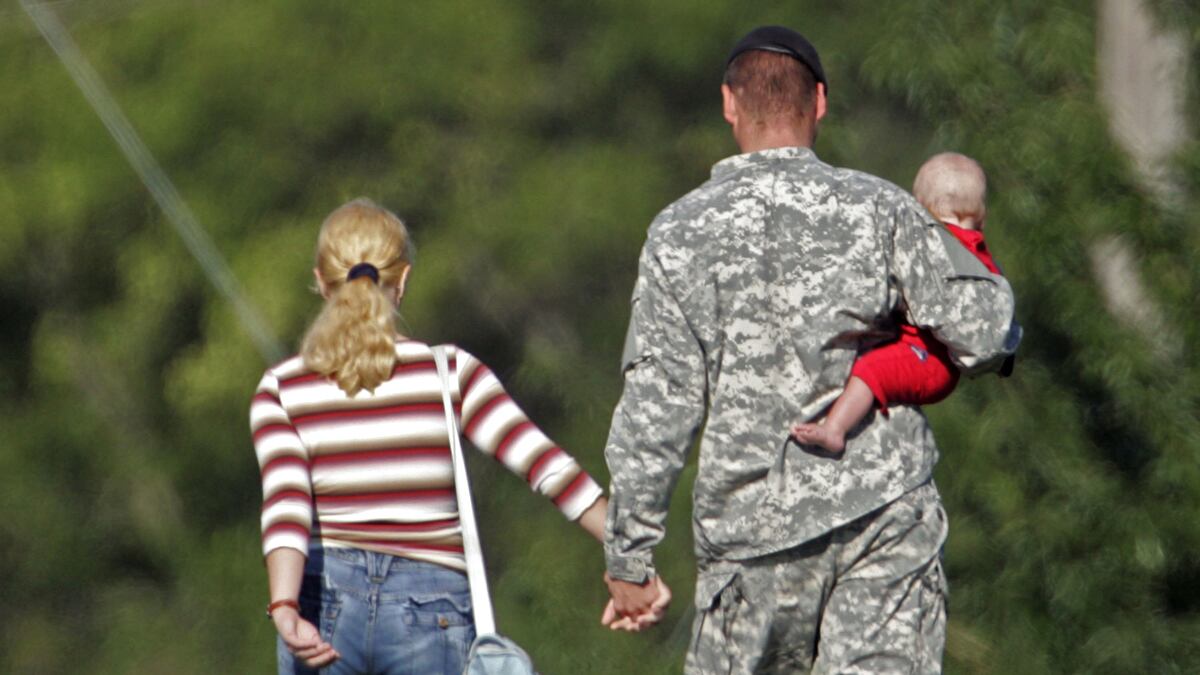Most of us will, blessedly, never be in Karilyn Bales’s shoes. We will never know what it is like to discover that the person we married, the father of our two young children, has been accused of mass murder. Most of us wouldn’t even be able to begin to imagine how we might feel, or what we might do.

But most of us aren’t married to men in the military. Those who are—the more than one-million-strong ‘milspouses’ who make up the ‘silent ranks’ of the U.S. Armed Forces—can imagine it all too well. In the days after the news broke that Staff Sgt. Robert Bales, a 38-year-old father of two from Joint Base Lewis-McChord in Washington State, had allegedly killed 16 Afghan civilians, many veterans and service members hastened to distance themselves from the horrific act, rejecting the notion that PTSD or combat stress could be blamed for the soldier’s actions. But while the men scurried, the women rallied, taking to their blogs and social networks to voice their unconditional support for Bales’s wife, whom many even began to call ‘Kari.’
Sequestered on a military base in Washington State with her 4-year-old daughter, Quincy, and 3-year-old son, Bobby, Karilyn Bales reportedly hasn’t seen her husband—who is now in solitary confinement in a military prison at Fort Leavenworth, Kansas—since he was deployed to Afghanistan in December. On Monday, she issued her first statement since the news of her husband’s alleged attacks broke. “I too want to know what happened. I want to know how this could be,” she said. “The victims and their families are all in my prayers, as is my husband who I love very much.”
It was the thought of Bales sequestered on base, cut off from her friends, and her family in nearby Bellevue, that prompted Lori Volkman, a prosecutor in Washington State and the wife of a Marine reservist, to pen an open letter on her blog. “I can only imagine what you felt as you stared blankly at the officer who arrived without any answers to give,” she wrote. “And when I thought of my own husband and my own children, and how devastating it would be, I sat at my own dinner table with my mother, another military wife, and we cried for you.”
In three days, the post has gotten more than 10,000 hits, Volkman says. Visitors have left more than 150 comments (more than on anything else she has ever posted) and of them, just four are negative. “Kari, be strong and hold on to your beautiful children,” wrote Kimberley. “My family is sending love to yours as it sends those in Afghanistan that lost their loved ones that awful day.” Most, however, address just Bales. “Please remember, you really are not alone,” reads one typical entry. “Many are saying, ‘but for the grace of God, could have been my soldier.’”
Volkman’s is far from the only site where women are voicing such sentiments. Brittany Jaccaud wrote a similar open letter on her blog, His Military Wife. Army wives are posting in the comments sections of news articles, Facebook groups, and in the myriad online support groups that have sprung up for military spouses in recent years. What is expressed on these pages goes beyond simply woman to woman, or wife to wife. It reflects a unique solidarity—the kind that comes only from a shared experience that includes long stretches of single parenting, repeated relocations, and, of course, an almost unspeakable fear of what might happen during the next deployment.
“As military wives, our biggest fear is our husband not coming home,” Jaccaud told The Daily Beast. “We all go through the nightmares of something bad happening. We all go through that worry…. But never in our right minds could we fathom getting this call.”
Still, the news about Bales struck particularly close to home for the 27-year-old mother of three. Until last December, she and her husband—who, like Bales, is a staff sergeant—also were stationed at Lewis-McChord. “I don’t pretend to know what happened, but being a military member married to a staff sergeant, I’ve been there,” she says. “Same rank, same duty station. It’s frightening. It hit home that it could be anybody.”
That refrain—it could be anybody, it could have happened to any of us—shows up so often on blogs and comment pages that you might forget we’re talking about a man who allegedly targeted women and children in a brutal, murderous rampage. “The one thought that keeps coming back to me is there but for the grace of God….” Ellen M wrote beneath Volkman’s open letter. “This could have been anybody’s spouse.”
“Honestly, situations like this worried me just as the fear that he would be killed, captured or injured,” wrote Megan, whose blog says she is the wife of a wounded warrior, beneath a post about the attack on a military-run site called SpouseBuzz. “I feared that he would break and do something to dishonor himself, our family, and our nation.”
This is hardly the first time such fears, awful as they are, have been typed into comment boxes or blog entries by women such as these. More than two years ago, a woman named Julie Anna, whose husband had been in the military for nearly a decade, and also was stationed at Fort Lewis, wrote, “I have seen the wonderful man I met and married change after war and I have literally watched the demons dance around him through it all. The hell we, as a family, have gone through has been the worst nightmare I have ever endured.” Last October, reflecting on the trial of another sergeant accused of killing civilians in Afghanistan, she wrote that she and her husband were both on antidepressants, “as is the rest of the army population….okay maybe not everyone. Just the ones that have been in for several years now, the ones who will actually admit when things are really screwed up.”
They are heavy confessions, to be sure, ones that can feel invasive to read as an outsider. But together, these—along with sunnier blogs, the ones filled with photos of smiling children and stories about trips to Walmart gone awry, and indeed even the one written by Karilyn Bales herself—make up a sort of modern chronicle of the effect of war on the home front, analogous to the letters sent by our grandfathers during World War II and Vietnam.
“They write themselves into the larger conversation about the cost of war,” says Alison Buckholtz, the author of Standing By: The Making of an American Military Family in a Time of War. “These are our war logs.”
This—the cost of war on families, wives, and children—is something fewer and fewer of us can identify with. A Pew report released last year found that a smaller percentage of Americans today have served in the Armed Forces than at any other time since the period between the two World Wars—around half of 1 percent of us, or 1.5 million of 240 million Americans over age 18.
“There’s a bigger gap than ever between civilian families and military families,” Volkman told The Daily Beast. “We can all sympathize with Kari Bales, but we can’t all empathize with what she’s gone through….events like this can widen the gulf even further.”
But understanding the anguish of an American family surely comes easier than understanding that felt by Muhummad Wazir, the Afghan man who lost 11 members of his family—including his mother, wife, four daughters, and two sons—in last week’s massacre. Most of us, blessedly, are separated from that kind of pain by not just a gap, but a chasm.






